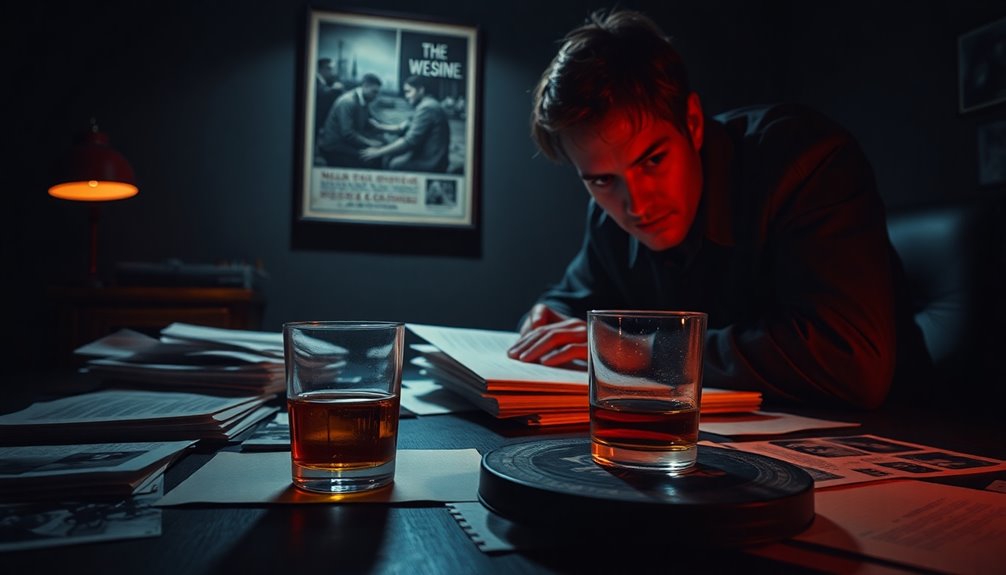If you love “Dexter,” you’ll appreciate shows like “Mr. Robot,” which explores mental health and duality, and “Hannibal,” with its chilling cat-and-mouse dynamic. “Breaking Bad” showcases moral decay through crime, while “The Following” offers psychological tension within a serial killer cult. “Mindhunter” takes you into the minds of infamous killers, and “Barry” combines dark humor with suspense. Want to discover even more gripping series that blur the lines of morality? There’s plenty more to uncover!
Key Takeaways
- Mr. Robot offers a deep psychological exploration of a cybersecurity engineer grappling with mental health issues and a double life, perfect for Dexter fans.
- Hannibal presents a chilling relationship between an FBI agent and a charismatic serial killer, blurring moral lines and exploring psychological complexities.
- Breaking Bad chronicles Walter White’s transformation into a ruthless drug lord, delving into ambition, morality, and the consequences of crime.
- Mindhunter follows the early days of criminal profiling in the FBI, examining notorious serial killers to uncover their motives and behaviors.
- Barry combines dark comedy with suspense, focusing on a hitman who pursues acting, raising questions about morality and the consequences of violence.
Mr. Robot

If you’re looking to immerse yourself in a gripping series that echoes the moral complexities of “Dexter,” “Mr. Robot” is a must-watch.
Centered around Elliot Alderson, a cybersecurity engineer portrayed by Rami Malek, the show dives deep into the struggles of living double lives and battling mental health issues while seeking to dismantle corporate corruption.
This dark thriller captivates with its morally complex characters and unique narrative style, drawing you into Elliot’s troubled psyche.
With critical acclaim for its writing and performances, “Mr. Robot” offers a relevant commentary on modern society, technology, and capitalism.
The series concludes strongly, providing a satisfying resolution to Elliot’s journey, leaving you both provoked and enthralled. Additionally, the exploration of ethical frameworks reflects the broader societal implications of technology in our lives.
The Fall

As you plunge into “The Fall,” you’ll find a gripping psychological thriller that intricately weaves the lives of a detective and a serial killer. Starring Gillian Anderson as DSI Stella Gibson, the series focuses on her intense crime investigation against Paul Spector, played by Jamie Dornan. Their cat-and-mouse thriller unfolds over three seasons, showcasing the complex psychology behind both characters.
| Element | Description | Impact |
|---|---|---|
| DSI Stella Gibson | Strong female lead | Breaks stereotypes |
| Paul Spector | Charismatic yet chilling killer | Heightens tension |
| Real-life cases | Inspired by BTK Killer | Adds realism |
| Emotional toll | Effects on victims’ families | Evokes empathy |
| Slow-burn style | Gradual character development | Deepens engagement |
“The Fall” is a haunting exploration of duality and obsession. The show effectively illustrates the concept of emotional dysregulation, as both protagonists grapple with their inner turmoil while navigating their complex relationship.
Hannibal

After exploring the psychological tension in “The Fall,” you might find yourself captivated by “Hannibal,” a series that takes the complexity of human minds to new heights.
This visually stunning show investigates the morbidly beautiful violence that characterizes the relationship between FBI agent Will Graham and the notorious Hannibal Lecter, played masterfully by Mads Mikkelsen.
Their complex relationship blurs the lines between hunter and hunted, revealing the psychological depth of both characters. As Graham grapples with the mind of a serial killer, the series challenges your perceptions of morality and empathy.
The intricate bond between hunter and hunted unveils profound psychological insights, reshaping our understanding of morality and empathy.
With its rich storytelling and intense psychological thrillers, “Hannibal” captivates you, making it a must-watch for fans seeking a dark, gripping narrative. The dynamics of their relationship highlight the appeal of emotional unavailability often found in complicated partnerships.
Prodigal Son

While delving into the intricate world of criminal profiling, “Prodigal Son” introduces you to Malcolm Bright, a gifted profiler who possesses a unique insight into the minds of serial killers.
As the prodigal son of infamous serial killer Martin Whitly, also known as The Surgeon, Malcolm grapples with a complex relationship that shapes his identity.
The series artfully blends psychological thriller elements with dark humor, making it a standout in the crime dramas genre.
With intense story arcs, including a chilling copycat killer, Malcolm’s journey—masterfully portrayed by Tom Payne—explores his moral compass and inherited traits.
“Prodigal Son” captivates audiences, showcasing engaging character development and suspenseful storytelling that keeps you on the edge of your seat. Additionally, the show highlights the psychological complexities that can arise in individuals with a BPD parent, emphasizing the impact on their emotional stability.
Barry

If you’re looking for a series that masterfully intertwines dark comedy with crime drama, “Barry” is a must-watch. Starring Bill Hader as a low-level hitman, the show explores his newfound passion for acting, creating a compelling conflict between his criminal identity and desire for change. With its critical acclaim, including multiple Emmy Awards, “Barry” investigates the moral implications of a life steeped in violence. Regular viewers often find themselves reflecting on the characters’ emotional well-being amidst the chaos of their actions.
| Aspect | Details |
|---|---|
| Genre | Dark Comedy / Crime Drama |
| Themes | Identity, Belonging, Violence |
| Awards | Multiple Emmy Awards |
The strong supporting cast, featuring talents like Henry Winkler, enhances the series’ intricate character development, balancing humor with intense moments.
Breaking Bad

In “Breaking Bad,” you witness Walter White’s shocking moral decline as he transforms from a mild-mannered teacher into a ruthless drug lord.
The complex dynamics between Walter and Jesse Pinkman unravel the chaos of their double lives, revealing how crime impacts their relationships.
This series masterfully explores the depths of human morality and the consequences that follow. Additionally, the use of sound therapy has been shown to reduce anxiety and stress, which can be particularly relevant for viewers grappling with the intense themes presented in the show.
Moral Decline Exploration
The moral decline explored in *Breaking Bad* captivates viewers with its gripping narrative of Walter White’s transformation. You witness a high school chemistry teacher slip into the depths of crime, revealing the psychological drama behind his choices.
This crime thriller investigates complex moral dilemmas, showcasing how ambition can corrupt.
- Walter’s descent into a world of meth manufacturing
- The impact of terminal illness on ethical judgment
- The consequences of violence and betrayal in his life
- His partnership with Jesse Pinkman and its moral implications
- A cautionary tale about power’s corrupting influence
As Walter’s actions blur the lines between right and wrong, you’re left questioning your own moral compass in a world filled with serial killers and criminals. This narrative resonates with themes of moral decline exploration, reflecting how individuals can justify their actions in the pursuit of power and success.
Complex Character Dynamics
While exploring *Breaking Bad*, you quickly realize that the dynamics between characters like Walter White and Jesse Pinkman are pivotal to the show’s depth. Their relationship embodies complex character dynamics, revealing how ambition and personal struggles can lead to moral ambiguity. Walter, an antihero at heart, manipulates Jesse, showcasing the darker side of loyalty and the consequences of their choices. As Walter transforms into the ruthless “Heisenberg,” the crime thriller exposes the duality of his character. Additionally, the series illustrates the importance of data analysis speed in understanding criminal behavior and the impact of choices made under pressure.
| Character | Role | Struggle |
|---|---|---|
| Walter White | Antihero | Moral decline |
| Jesse Pinkman | Former student | Loyalty vs. manipulation |
| Skyler White | Wife | Family vs. crime |
| Hank Schrader | Brother-in-law | Law vs. personal ties |
| Saul Goodman | Lawyer | Ethics vs. ambition |
Double Lives Unraveled
As Walter White’s descent into the drug trade unfolds, you witness the stark contrast between his mundane life as a chemistry teacher and the explosive world of crime he embraces.
This acclaimed series masterfully unravels the double lives that Walter leads, highlighting his moral decline from a timid educator to a ruthless criminal mastermind.
Key themes include:
- The impact of crime on family dynamics
- The transformation of Walter’s character
- The consequences of deceit and secrecy
- The struggle for power and control
- The relentless pursuit of ambition
Breaking Bad isn’t just a crime show; it’s a gripping family drama that captures the catastrophic fallout of Walter’s choices, leaving viewers questioning the cost of his double life. Additionally, the series illustrates how financial misconduct in alimony decisions can complicate relationships and personal integrity.
The Following

In “The Following,” you witness the chilling dynamics of a serial killer cult led by Joe Carroll, which adds a layer of psychological horror to the narrative.
As Ryan Hardy races to stop the gruesome plans of Carroll’s followers, you’ll feel the tension build with each episode.
The show brilliantly explores how charisma can manipulate loyalty, turning ordinary people into deadly accomplices. This manipulation often reflects the concept of emotional alignment, where individuals may lose their sense of self in the pursuit of acceptance within the group.
Serial Killer Cult Dynamics
Serial killer cult dynamics are chillingly explored in *The Following*, where Joe Carroll, a notorious murderer, escapes death row to create a network of devoted followers.
This psychological horror series investigates how charismatic leadership can manipulate vulnerable individuals into a life of crime, showcasing a disturbing bond between the killer and his cult.
Ryan Hardy, the former FBI agent, finds himself in a tense pursuit of Carroll, making for a thrilling premise that captivates crime lovers.
- Obsession and loyalty among followers
- The power of charismatic manipulation
- The descent into violence
- The impact of cult dynamics on morality
- The cat-and-mouse game with law enforcement
Psychological Horror Elements
Cult dynamics in *The Following* set the stage for a deeper exploration of psychological horror elements that permeate the series.
As you probe into the mind of Joe Carroll, a notorious serial killer, you witness the chilling psychological manipulation that fuels his cult of killers.
The cat-and-mouse dynamic between former FBI agent Ryan Hardy and Carroll embodies a battle of obsession, where each encounter reveals the impact of evil on the human psyche.
Gruesome acts of violence heighten the tension and evoke dread, immersing you in a world where fear reigns.
This series masterfully captures the essence of psychological horror, forcing you to confront the darkest corners of humanity and the terrifying depths of obsession.
Mindhunter

While exploring the dark depths of criminal psychology, Mindhunter captivates viewers with its chilling portrayal of the early days of the FBI’s Behavioral Science Unit.
You’ll follow FBI agents Holden Ford and Bill Tench as they investigate the minds of notorious serial killers, seeking to understand their motives and behaviors.
Based on the true-crime book by John E. Douglas, the series excels in psychological insights and character development.
- Deep exploration of serial killers’ psychology
- Groundbreaking techniques in criminal profiling
- Real-life inspirations and meticulous detail
- Acclaimed writing and direction
- Powerful performances from the cast
With its gripping narrative, Mindhunter draws you into the unsettling world of crime and the complexities of the human psyche.
The Killing

The Killing immerses you in a haunting world of crime and consequence, following detectives Sarah Linden and Stephen Holder as they unravel the murder of a young girl.
This psychological crime drama captivates with its slow-paced storytelling and intricate plots, drawing you deep into the investigation. As you watch, you’ll feel the emotional depth of the victims’ families and the toll the case takes on the detectives themselves.
The series, based on the Danish show *Forbrydelsen*, showcases exceptional performances, particularly from Mireille Enos and Joel Kinnaman.
With atmospheric cinematography that enhances the suspense, *The Killing* keeps you engaged, making it a must-watch for anyone who appreciates the complexities of crime and morality in a chilling narrative.
Frequently Asked Questions
What Should I Watch if I Liked Dexter?
If you liked Dexter, you might enjoy Mr. Robot for its intense psychological themes and complex lead character.
Hannibal offers an enchanting look at the twisted relationship between an FBI agent and a brilliant killer.
The Fall presents a thrilling cat-and-mouse chase that investigates the minds of both detective and criminal.
Prodigal Son explores family dynamics tied to a serial killer’s legacy, while Mindhunter gives you a chilling insight into criminal psychology.
What Is the Spin-Off of Dexter?
The spin-off of Dexter is titled “Dexter: New Blood.”
It picks up with Dexter Morgan, played by Michael C. Hall, as he adjusts to life in a new town while grappling with his troubled past.
This limited series revival premiered on November 7, 2021, and consists of ten episodes.
Fans appreciated its character development and storytelling, providing a satisfying conclusion to the original series while addressing its controversial ending.
What Show on Netflix Is Like Dexter?
If you’re looking for a show on Netflix that’s like Dexter, check out Mindhunter.
It dives into the minds of serial killers, exploring the psychological aspects that drive their actions. You’ll find a gripping narrative as FBI agents interview these criminals, much like Dexter’s complex character journey.
Another great choice is You, which follows a charming yet dangerous protagonist who blurs the line between love and obsession, echoing Dexter’s dark themes.
What Is the Series After Dexter?
Daringly diving into Dexter’s dark domain, you’ll find “Dexter: New Blood” is the next gripping chapter.
This limited series picks up a decade after the original, reintroducing a more complex Dexter Morgan, now living under a new identity.
If you’re enthusiastic for more, “Dexter: Original Sin” explores the origins of his infamous code.
Both series expand on his chilling legacy, keeping you on the edge of your seat with every twist and turn.
Conclusion
If you’re a fan of Dexter, these gripping shows are sure to keep you on the edge of your seat like a tightrope walker balancing high above the ground. Each series offers a unique twist on crime and suspense, drawing you into their dark worlds. Whether you’re into psychological thrillers or character-driven narratives, there’s something here for everyone. So grab your popcorn, turn off the lights, and get ready for a binge-worthy experience that’ll leave you breathless!









